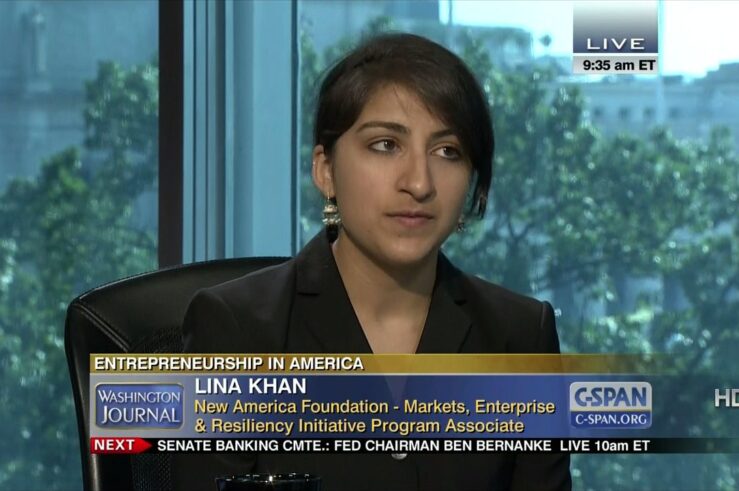Showing archive for: “Monopolization”
What Lina Khan’s appointment means for the House antitrust bills
Her appointment also comes as House Democrats are preparing to mark up five bills designed to regulate Big Tech and, in the process, vastly expand the FTC’s powers. This expansion may combine with Khan’s appointment in ways that lawmakers considering the bills have not yet considered. This is a critical time for the FTC. It ... What Lina Khan’s appointment means for the House antitrust bills
The Supreme Court Misses the Big Consumer Welfare Picture in NCAA v. Alston
In its June 21 opinion in NCAA v. Alston, a unanimous U.S. Supreme Court affirmed the 9th U.S. Circuit Court of Appeals and thereby upheld a district court injunction finding unlawful certain National Collegiate Athletic Association (NCAA) rules limiting the education-related benefits schools may make available to student athletes. The decision will come as no ... The Supreme Court Misses the Big Consumer Welfare Picture in NCAA v. Alston
NY ‘Abuse of Dominance’ Bill Attacks Consumer Welfare and the US Antitrust Tradition
U.S. antitrust law is designed to protect competition, not individual competitors. That simple observation lies at the heart of the Consumer Welfare Standard that for years has been the cornerstone of American antitrust policy. An alternative enforcement policy focused on protecting individual firms would discourage highly efficient and innovative conduct by a successful entity, because ... NY ‘Abuse of Dominance’ Bill Attacks Consumer Welfare and the US Antitrust Tradition
Breaking Down House Democrats’ Forthcoming Competition Bills
Democratic leadership of the House Judiciary Committee have leaked the approach they plan to take to revise U.S. antitrust law and enforcement, with a particular focus on digital platforms. Broadly speaking, the bills would: raise fees for larger mergers and increase appropriations to the FTC and DOJ; require data portability and interoperability; declare that large ... Breaking Down House Democrats’ Forthcoming Competition Bills
European Commission Objection to App Store Rules Lack Empirical Support
The European Commission recently issued a formal Statement of Objections (SO) in which it charges Apple with antitrust breach. In a nutshell, the commission argues that Apple prevents app developers—in this case, Spotify—from using alternative in-app purchase systems (IAPs) other than Apple’s own, or steering them towards other, cheaper payment methods on another site. This, ... European Commission Objection to App Store Rules Lack Empirical Support
Four Reasons to Reject Neo-Brandeisian Critiques of the Consumer Welfare Approach to Antitrust
In the battle of ideas, it is quite useful to be able to brandish clear and concise debating points in support of a proposition, backed by solid analysis. Toward that end, in a recent primer about antitrust law published by the Mercatus Center, I advance four reasons to reject neo-Brandeisian critiques of the consensus (at ... Four Reasons to Reject Neo-Brandeisian Critiques of the Consumer Welfare Approach to Antitrust
The FTC Did Not ‘Fumble the Future’ in Its Google Search Investigation
Politico has released a cache of confidential Federal Trade Commission (FTC) documents in connection with a series of articles on the commission’s antitrust probe into Google Search a decade ago. The headline of the first piece in the series argues the FTC “fumbled the future” by failing to follow through on staff recommendations to pursue ... The FTC Did Not ‘Fumble the Future’ in Its Google Search Investigation
Investors and Regulators Can Both Fall for Platform Bubbles
In current discussions of technology markets, few words are heard more often than “platform.” Initial public offering (IPO) prospectuses use “platform” to describe a service that is bound to dominate a digital market. Antitrust regulators use “platform” to describe a service that dominates a digital market or threatens to do so. In either case, “platform” denotes power ... Investors and Regulators Can Both Fall for Platform Bubbles
Antitrust by Fiat
The Competition and Antitrust Law Enforcement Reform Act (CALERA), recently introduced in the U.S. Senate, exhibits a remarkable willingness to cast aside decades of evidentiary standards that courts have developed to uphold the rule of law by precluding factually and economically ungrounded applications of antitrust law. Without those safeguards, antitrust enforcement is prone to be ... Antitrust by Fiat
How Antitrust Regulators Could Use the ‘Perpetual Inventory Method’ to Value R&D
The slew of recent antitrust cases in the digital, tech, and pharmaceutical industries has brought significant attention to the investments many firms in these industries make in “intangibles,” such as software and research and development (R&D). Intangibles are recognized to have an important effect on a company’s (and the economy’s) performance. For example, Jonathan Haskel ... How Antitrust Regulators Could Use the ‘Perpetual Inventory Method’ to Value R&D
The NCAA: Dr Jekyll or Mr Hyde?
The U.S. Supreme Court will hear a challenge next month to the 9th U.S. Circuit Court of Appeals’ 2020 decision in NCAA v. Alston. Alston affirmed a district court decision that enjoined the National Collegiate Athletic Association (NCAA) from enforcing rules that restrict the education-related benefits its member institutions may offer students who play Football ... The NCAA: Dr Jekyll or Mr Hyde?
The DOJ’s Antitrust Case Against Google: A Tough Slog, but Maybe an Intriguing Possibility?
The U.S. Department of Justice’s (DOJ) antitrust case against Google, which was filed in October 2020, will be a tough slog.[1] It is an alleged monopolization (Sherman Act, Sec. 2) case; and monopolization cases are always a tough slog. In this brief essay I will lay out some of the issues in the case and raise ... The DOJ’s Antitrust Case Against Google: A Tough Slog, but Maybe an Intriguing Possibility?













